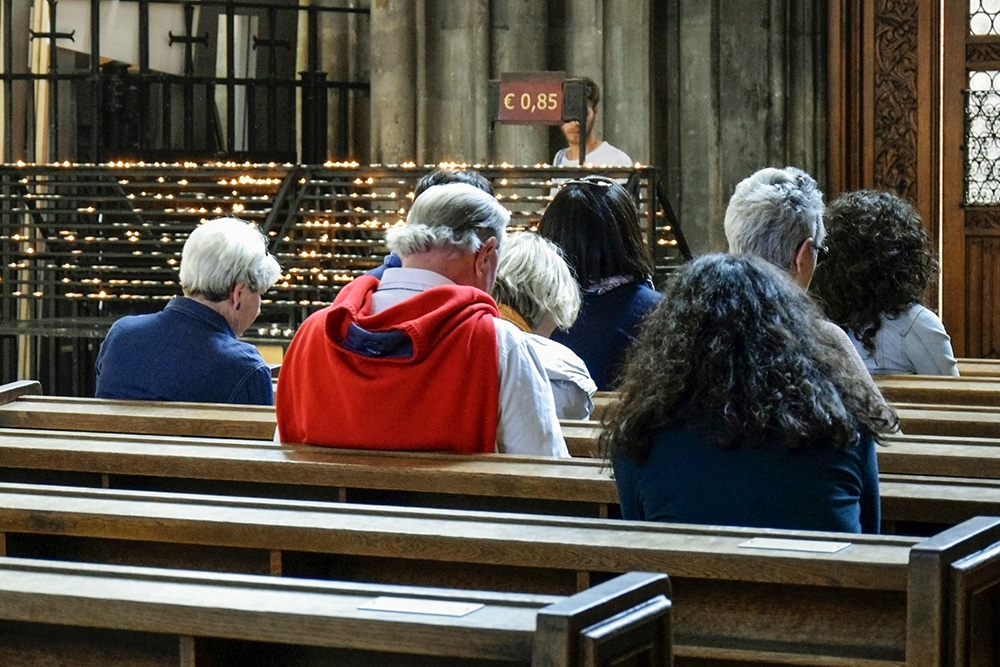
Parishioners pray during Mass at a Catholic church in Vienna in May 2019. Many of the recommendations from the final report of the 2021-24 synod on synodality are already being practiced, the Austrian bishops said in a statement, not least through the 40,000 elected members working in the church's parish councils and asset management boards. (Dreamstime/Marina Novitkaia)
In the weeks following the conclusion of the church's synod on synodality, Europe's bishops have been pondering its practical implications, especially in more conservative countries where some reform postulates have faced resistance.
"Debates on the synod have been less audible here than in the West — and while some bishops have strongly supported it, others have been quite indifferent," explained Marcin Przeciszewski, director of the Polish church's Catholic Information Agency, KAI. "We must see how churches like ours embrace the synodal process. But I think its gradual unfolding will offer a significant chance to us, now that we find ourselves at a serious and potentially dangerous turning point."
Przeciszewski has been one of many mulling the likely impact of recommendations for "spiritual renewal and structural reform" contained in the synod's lengthy final report.
He told NCR the synodal model could help the Polish church face pressures from Western-style secularization, as the church's authority is questioned amid declining Mass attendance and dwindling vocations in Poland.
Yet implementing the synod's calls for wider "transparency, accountability and evaluation" would take time, the KAI director warned.
By contrast, across Europe in Belgium, home base of the European Union and NATO, some proposed changes look set to happen more easily. Although clericalist attitudes survive here, too, among both clergy and laity, three-year guidelines are already being drawn up to "implement synodality at all levels," according to the Belgian bishops' spokesman.
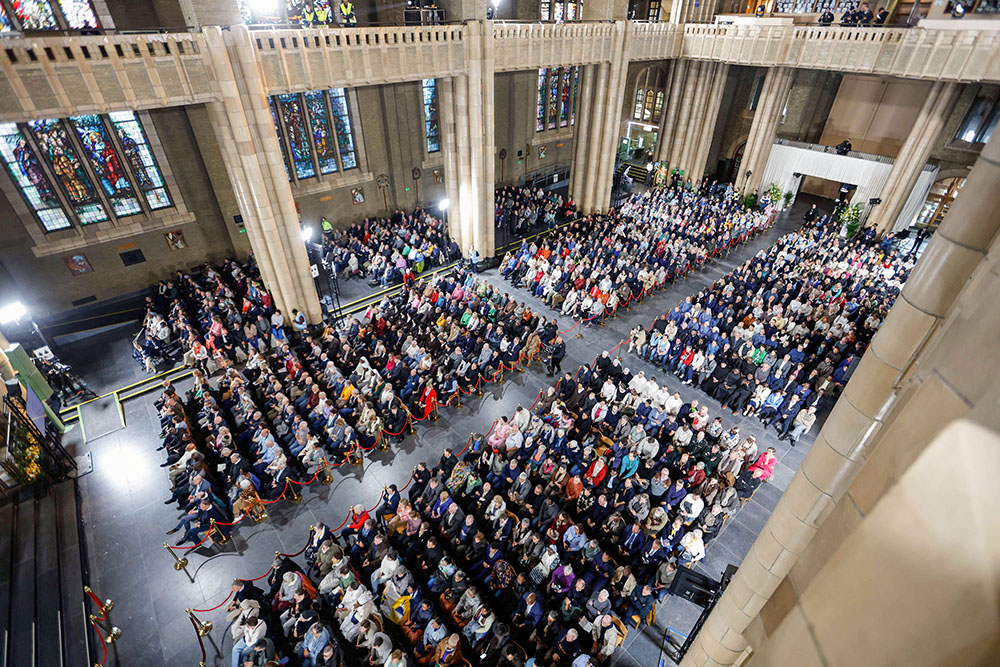
Some 2,600 people gather in the Basilica of the Sacred Heart for a meeting with Pope Francis during a papal visit to Brussels Sept. 28, 2024. The meeting included bishops, priests, deacons, religious, seminarians and pastoral workers ministering in Belgium. (CNS/Lola Gomez)
"The synod hasn't ordered precise, immediate changes — and many questions, such as on the diaconate of women, will continue to be reflected on," Jesuit Fr. Tommy Scholtes told NCR. "But many parishes were active in preparations for the synod and are keen to follow through on its conclusions, especially when it comes to listening together to the Holy Spirit and changing the church's methods of governance."
Launched by Pope Francis in 2021, the 16th General Assembly of the Synod of Bishops was the first to include laypeople among its 370 Rome delegates, and concluded on Oct. 27 with a 28,000-word text, "For a Synodal Church: Communion, Participation, Mission."
Among recommendations, the document urges full implementation of "opportunities regarding the role of women" in leadership, and calls for laypeople to be "given greater opportunities for participation" in non-priestly "forms of service and ministry," as well as in "the choice of bishops."
With Francis approving the text as part of his papal magisterium, most European bishops' conferences have formally welcomed it and pledged to abide by its conclusions.
And while some Catholics have been disappointed by its apparent restraint, most have accepted that the synodal process of "discernment and deepening" will continue as further changes gain consensus.
In a Nov. 8 statement, Austria's bishops confirmed their "full support" for the synodal process and wished to see it "internalized as an attitude and concretized in forms and structures."
Advertisement
While a "national synod team" will identify areas still needing action in Austria, many of the final report's recommendations are already being practiced, the statement said, not least through the 40,000 elected members working in the church's parish councils and asset management boards.
While remaining open to the possibility of female deacons, the Austrian bishops plan to increase the proportion of women working at their church's "highest management level" to one third by 2029.
In Spain, the bishops' conference provided a daily summary of main synod events on its website, while in Italy, a synodal assembly with more than 1,000 delegates was convened in Rome on Nov. 15-17, as a new survey highlighted a widespread wish for change among local Catholics.
In France, the bishops' conference has prepared a synodal vade mecum, or guidebook, for parishes and dioceses, according to its chairman, Archbishop Éric de Moulins-Beaufort, placing the whole church "on a path of interior transformation."
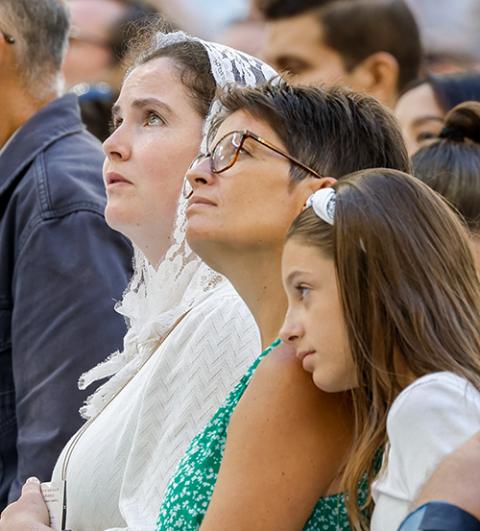
People gather for Mass with Pope Francis at the Vélodrome Stadium in Marseille, France, Sept. 23, 2023. (CNS/Lola Gomez)
Here as elsewhere, a working group will be set up to improve the mission of priests and deacons, the place of women in church offices and the ministry of laypeople, the Reims archbishop told the French bishops' plenary at Lourdes on Nov. 10.
Scholtes, the Belgian church spokesman, said, "There's no doubt much greater opportunity is being created for forms of representation, participation and encounter in church life, as well as through the wider space assigned to bishops' conferences and this new way of living as a church. If the church truly lives out the evangelical message of the Gospel, its witness to hope will become even stronger, despite all the problems it's experienced over recent years."
Beneath the surface, there are tensions, however, as each national church grapples with its own traditions and priorities.
In Germany, the Catholic church launched its own Synodaler Weg, or Synodal Path, reform discussions in December 2019, covering women's ordination, voluntary celibacy, sexual morals and other issues.
Catholics in Germany have welcomed the final report's calls for a "salutary decentralization," allowing further work on the "doctrinal and disciplinary competence" of bishops' conferences in identifying "appropriate liturgical, catechetical, disciplinary, pastoral, theological and spiritual expressions" of the faith in local cultural contexts.
Limburg Bishop Georg Bätzing, the German bishops' conference president, has voiced confidence in the final report's stress on the "sensus fidelium," or intuition of ordinary believers, as well as on the responsibility of lay Catholics and the need for transparency and accountability in top-level decision-making.
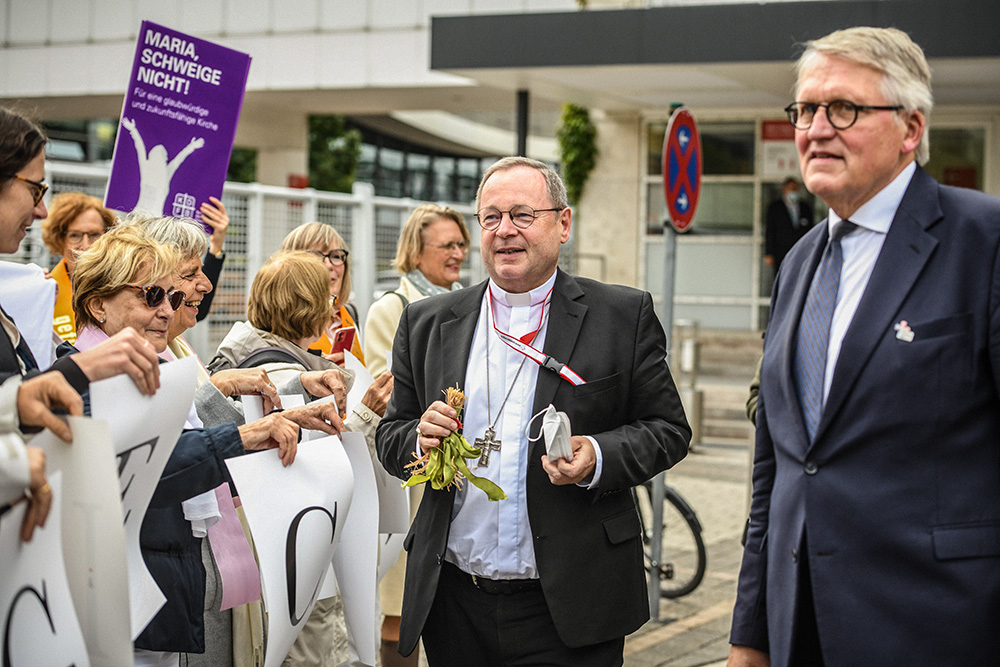
The co-presidents of Germany's Synodal Path project, Bishop Georg Bätzing, president of the German bishops' conference, and Thomas Sternberg, president of the Central Committee of German Catholics, speak to women during a protest by Maria 2.0 and We Are Church outside the Synodal Assembly in Frankfurt, Germany, Sept. 30, 2021. (CNS/KNA/Julia Steinbrecht)
The document's "timid but irreversible" conclusions, Bätzing insisted recently, will be supplemented by his church's own debates, bringing Germany's Synodal Path, which has faced several Vatican rebukes, closer to the whole church's synodal process.
This has been disputed, however, by Cardinal Rainer Maria Woelki of Cologne and three other conservative German bishops, who've vowed to boycott further German debates, insisting the liberal "goals and content" of the German Synodal Path are quite different.
Disagreements on church reforms have a sensitive edge in Germany, where the Speyer Diocese became the latest this month to announce a radical restructuring program in the face of falling numbers and a loss of public trust.
The German bishops' conference spokesman, Matthias Kopp, told NCR the church's leaders would not, for now, be making further comment on the Rome synod.
Reactions to the final report have also been mixed across Eastern Europe, where most bishops' conferences have done little to publicize it.
In Poland, the church's official synod delegates, headed by Archbishop Józef Górzyński of Warmia, told a Nov. 5 press conference that the report's "fruitful guidelines" should be viewed as a continuation of the 1962-65 Second Vatican Council.
Understanding and applying the synod's "desirable postulates," however, would present challenges and take time, the Polish delegates warned.
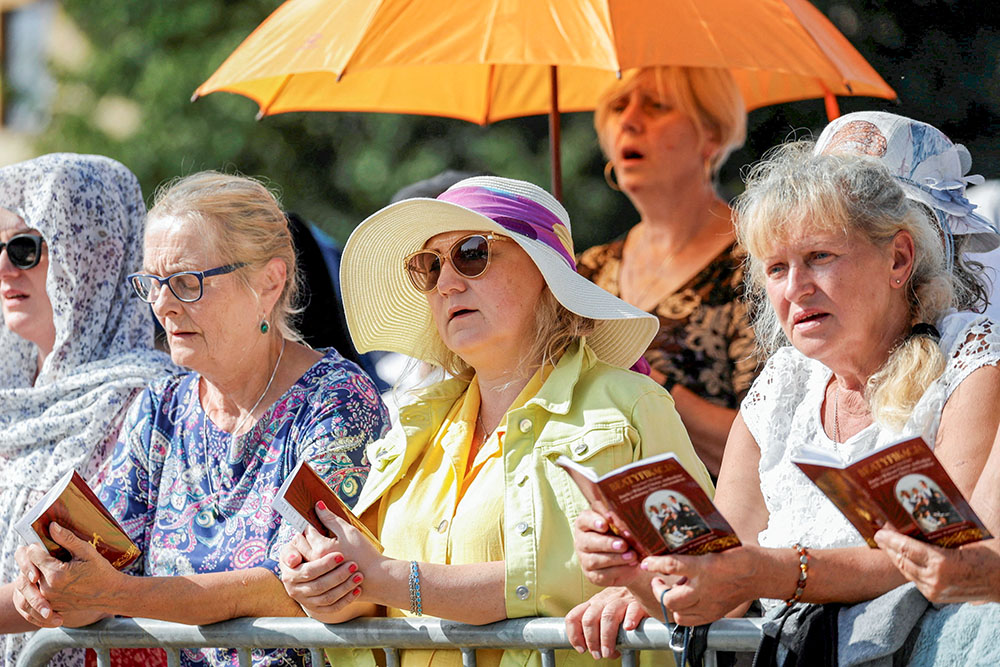
Women pray during the Sept. 10, 2023, Mass in Markowa, Poland, for the beatification of the Ulma family, who were martyred in Markowa for sheltering Jews under German occupation during World War II. (OSV News/Agencja Wyborcza.pl via Reuters/Patryk Ogorzalek)
In neighboring Slovakia, church leaders were informed about the synod on Nov. 6 by their chief delegate, Archbishop Jonáš Maxim of Prešov, who insisted that many of its recommendations were "already being realized."
While the church should be "relational, not pyramidal," Maxim added, there would nevertheless be issues over the role of women, as well as over "cooperation and communication" between clergy and laity.
In Hungary, the church's Magyar Kurir news agency reported on the pope's closing synod address but made only a brief mention of the final report.
In Serbia, Archbishop Ladislav Nemet of Belgrade, newly named a cardinal, urged fellow bishops to accept they "owe an account to believers," but also cautioned that issues such as the place of women would be "understood and applied differently in different contexts," as each local church dealt with its own "situation, culture and needs."
Despite the mixed pointers, Przeciszewski, the Polish KAI director, remains confident that change will come — and that all national churches, even in Eastern Europe, will sooner or later see benefits in embracing the synodal model of "consultation and discernment."
Up to 100,000 Polish Catholics joined synodal parish groups when national consultations were launched in 2021, and there've been calls for a national Polish synod, with full lay participation, to confront the church's pastoral and missionary tasks, especially among young people.
Meanwhile, he's heartened by the synod's observation that "authentic practices of synodality" could allow Christians "to develop a culture capable of critical prophecy" that helps reconstruct a sense of the common good, in societies marked by "growing disillusionment with traditional models of government, and disenchantment with the functioning of democracy."
"There's a part of the church which thinks nothing should change since any change poses a threat — and another part which thinks everything should change if we're to survive the historic pressures now at work," Przeciszewski told NCR.
"But the church also has a wider responsibility to create a community where everyone, whatever their views and affiliations, can meet and greet each other as friends. If we as a church can show how to listen and speak to others, this will help society at a time when fractures and animosities run deep."






